This month, we are taking a deeper dive into one of our key markets on Groundfloor's platform and the "Music City" of America: Nashville, Tennessee. We'll be providing comprehensive insight into the area to help you make informed decisions when it comes to real estate investing.
Nashville is part of the Nashville-Davidson–Murfreesboro–Franklin Metropolitan Statistical Area (MSA), which is also commonly referred to as the Nashville metropolitan area. The Nashville MSA encompasses 14 counties in middle Tennessee, including Davidson, Cheatham, Dickson, Maury, Rutherford, Sumner, Williamson, and Wilson, just to name a few. As of the 2020 Census, the Nashville MSA had a population of over 2 million people, making it the largest metropolitan area in the state of Tennessee.
The Nashville metro area is centered around the city of Nashville, which is the capital of Tennessee and the largest city in the region. Other important cities and suburbs in the metro area include Franklin, Murfreesboro, Hendersonville, Brentwood, and Gallatin.
With its vibrant music scene, which includes country, rock, blues, and jazz music, Nashville is home to several music-related attractions, including the Country Music Hall of Fame and Museum and the world-famous Grand Ole Opry. This makes Nashville a cultural attraction for visitors and centers the area for viable real estate investment options like long and short-term rentals.
In addition to its music industry, the Nashville metro area is also known for its healthcare industry, with several major hospitals and medical centers located in the region. Other important industries in the area include finance, technology, and manufacturing.
The largest employment sectors in the Nashville MSA include:
- Healthcare and Social Assistance: The healthcare sector is the largest employer in the Nashville MSA - with a significant number of hospitals, medical centers, and clinics located throughout the region.
- Retail Trade: Retail is also a significant employer in the Nashville MSA, with several large shopping malls and retail centers located in the region.
- Accommodation and Food Services: The tourism industry is an important part of the Nashville economy, and the accommodation and food services sector employs a large number of people in the region.
- Manufacturing: The Nashville MSA has a diverse manufacturing industry, with companies producing everything from cars and car parts to food products and medical devices.
- Professional and Business Services: The professional and business services sector includes a range of industries, such as accounting, legal, and consulting services, and is an important source of employment in the Nashville MSA.
Other significant employment sectors in the Nashville MSA include education, transportation and warehousing, and construction.
Here is a list of some of Nashville’s largest employers:

Nashville has experienced phenomenal growth over the last decade and has become a landing spot and top migration destination which has fueled double digit appreciation of residential real estate, which is our focus here.
According to Redfin, Los Angeles, Chicago and San Francisco were the cities where homebuyers searched Nashville as a relocation destination the most.
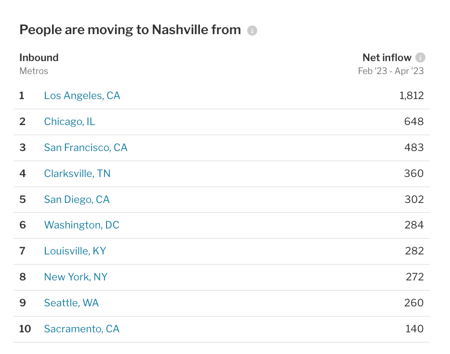
Migration to Nashville, particularly from the expensive West Coast cities like Los Angeles and San Francisco, makes a lot of sense. Nashville not only offers more affordable housing than those higher priced west coast cities, but it also offers plentiful employment opportunities across a diverse set of industries.
Because of the Nashville area's population growth and employment opportunities, the residential real estate market has seen steady appreciation since 2012. Below we see a 10-year chart of median home prices for the Nashville Metro Area. The clear trend up and to the right we see here is obvious for all housing types: “Entry-Level”, “Move-Up” and “Overall.”
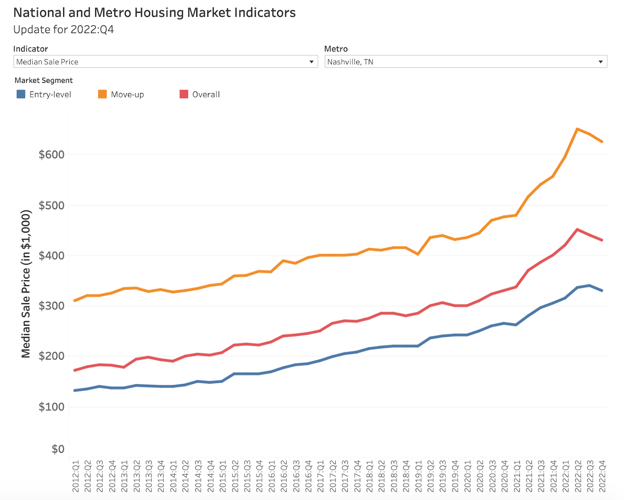
Source: AEI
Now that we’ve looked at the fundamental drivers that make the Nashville MSA an attractive growth area, let’s take a look at the current residential real estate market.
The Nashville area remains a Seller’s Market.
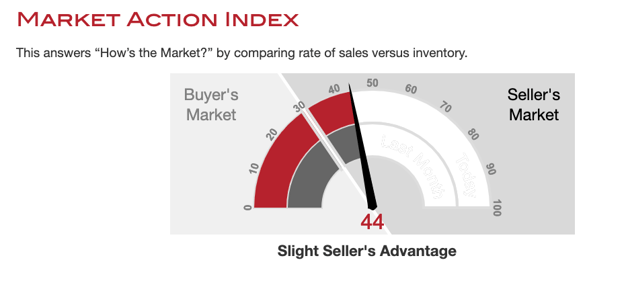
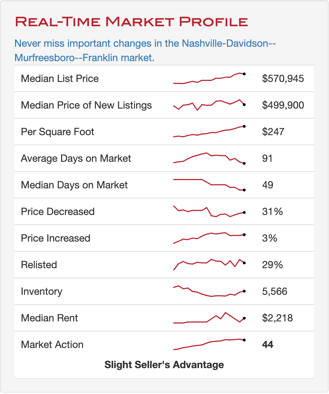
We note in the Market Profile that the Median List Price has increased over the last 90 days. The average and median days on market have decreased, while inventory has held constant if not decreased slightly and rents are stable. Rising interest rates led to a national slowdown of home buying throughout Q3 and Q4 of 2022 and this was evident in the number of listings with price decreases. But to the surprise of many, the spring market of 2023 has shown stability if not outright resiliency; most evidently seen in how many listings have experienced price decreases in the Nashville area, this percentage of listing price decreases has fallen consistently in the first quarter of 2023.
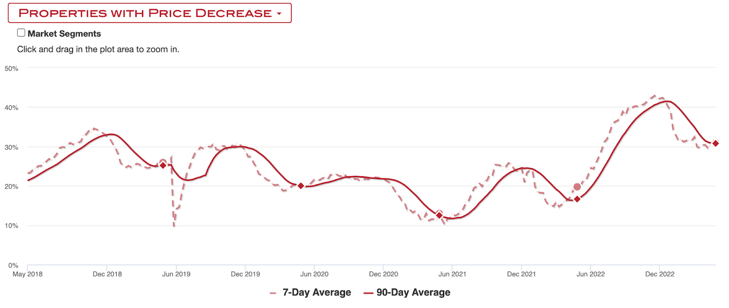
The same Spring bounce can be seen in the Median Price data. In June 2022, Median Price peaked in the Nashville MSA, while many market participants expected the worst; and indeed, we did see a seasonal decline in prices throughout Q4 of 2022. What was unexpected, however, was the near return to those peak price levels in the Spring of 23 (now!), but that is clearly what we are seeing - not gloomy catastrophic price weakness.
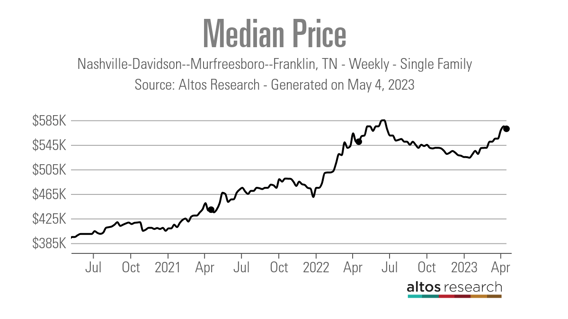
The below charts explore the relationship between the Residential housing inventory and population growth in the Nashville metro area.
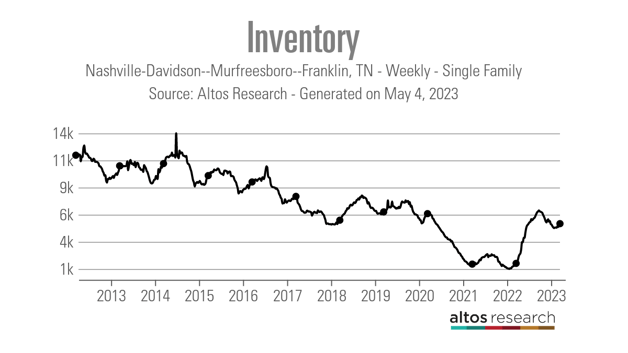

Metro Nashville Population 2012-2022
Housing Inventory declined steadily from 2012 until bottoming around January 2022. We note the population trend steadily increasing - the blue line (Population) moving up and to the right, and the black line (Inventory) down and to the right. This is not coincidental; Inventory decreased as population increased, pushing prices up. Logically, we can estimate that because of its cultural appeal, robust economic development, and charm, Nashville became a destination not just to visit but also to call home.
Groundfloor welcomes Nashville as a growth market and is actively partnering with other originators and market participants to boost our origination volume in this popular area.
We look forward to becoming the leading provider of short term debt to attractive residential builds and remodels - and visiting this area won’t be so bad either.


